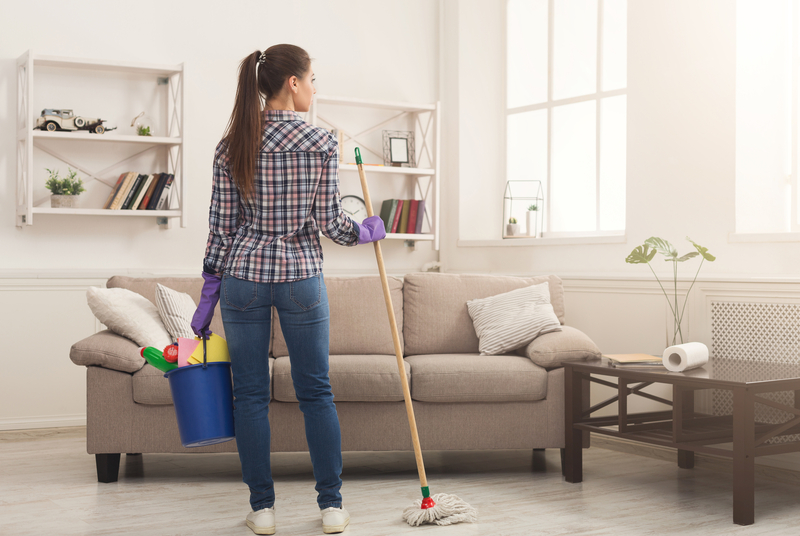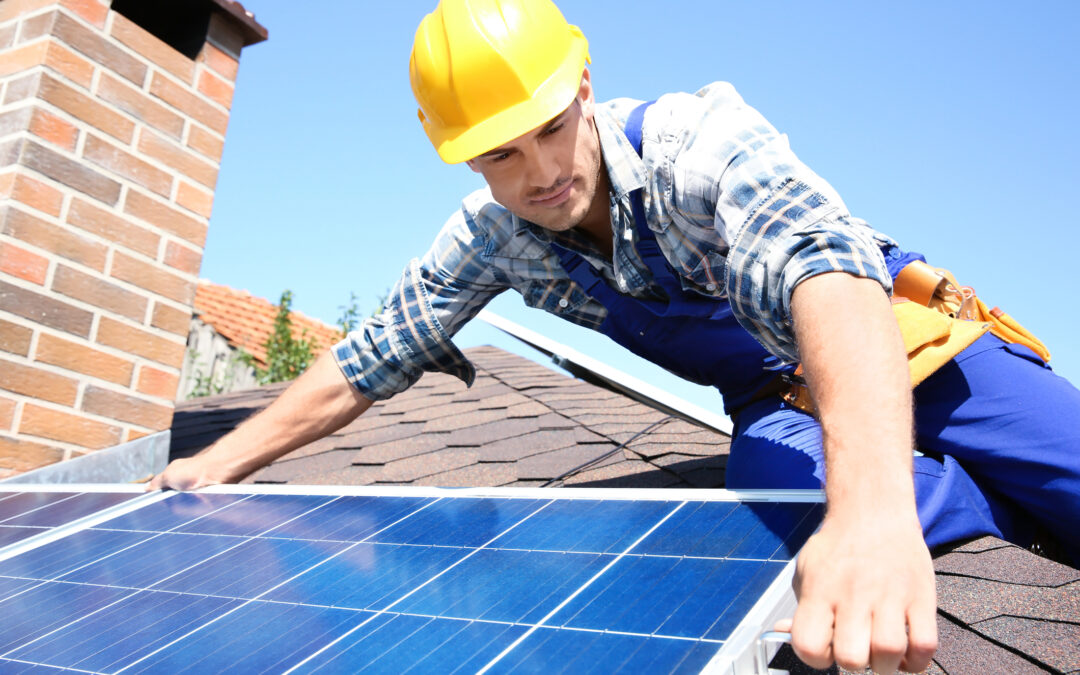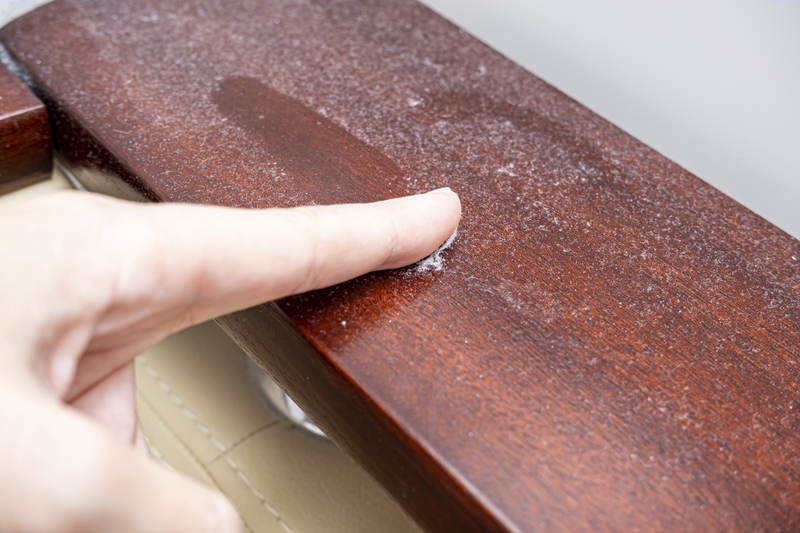
by Mrs C | Apr 5, 2022 | Blog
As Spring draws near, many people prepare for some Spring cleaning. This time of year is when everyone does a deep clean of their homes and since it’s not a regular occurrence, you may be at a loss for where to start. Before you begin your deep cleaning, there are a few things you should keep in mind.
Cleaning Supplies You Need
In order to give your home the best deep clean possible, you need to have the right tools. As you gather your supplies, keep in mind all the tasks you will need to do. You’ll be cleaning a variety of surfaces in your home, so you’ll need several different sponges, brushes, and clothes to get the job done. For example, you might want to use a toothbrush for scrubbing in between the tiles in your bathroom. You should also make sure you have rubber gloves, a broom and dustpan, a mop, a vacuum, garbage bags, a spray bottle, and any other supplies you would consider helpful. Once you have all the tools in place, you will also need to gather all the cleaning supplies. It’s a good idea to have a multi-purpose cleaner on hand. In fact, you can even find recipes to make your own. You also want to have cleaner for all the surfaces you will be handling. For example, you need a glass cleaner handy for windows and mirrors. To keep all your supplies organized as you deep clean, you may want to purchase a carrying caddy to take throughout the house.
Be Careful with Harsh Chemicals
Since you’re doing a deep clean, it’s likely you’ll be using more heavy duty cleaners. These cleaners will get the job done, but they are also more of a hazard. Before cleaning, make sure you are aware of what each of your chemicals do. Ammonia and other strong bases can be just as dangerous as acids. Additionally, some chemicals can be more dangerous when they’re mixed. For example, bleach and ammonia create a toxic vapor when they are mixed and it can damage your respiratory system. When cleaning, make sure you keep all chemicals out of reach of children.
Make a Plan
Deep cleaning can be overwhelming. To make the process easier and more efficient, you should make a plan for yourself. You can start off by decluttering your home. Once everything is put in its place, you can begin the deep clean process. It’s helpful if you take your home room by room. You can work from the top floor down, bottom floor up, or whatever method works for you. Having a plan, and maybe even a physical checklist, can help you have a better idea of what you’re going to do and what you’ve already accomplished.
It’s refreshing to deep clean your home. You get rid of all the dust, dirt, grime, etc. that has built up over time. However, it can be a long process. Make sure you know what you’re getting into before you get started.
Check out this article on home projects that can save you money overtime!

by Mrs C | Mar 16, 2022 | Blog
Home improvement projects are just a part of life as a homeowner. You are always looking for ways that you can make your house even better, even more efficient, even more beautiful, and even more perfect for your daily needs. Some homeowners shy away from their home projects because they worry about the cost. But in reality, home improvement projects can actually be a money saving endeavor in the long run. There are many projects that are huge goldmines. Here are three of the best home improvement projects that can save you money over time.
Installing a Programmable Thermostat
The first home improvement project that you could take on to save money over time is installing a programmable thermostat. A programmable thermostat can help you achieve a much more accurate temperature in your home, with its precise measurements. A programmable thermostat can also be set up to shut off during certain hours when no one is home and turn them back on before you get home. This allows you to save money on heating and cooling an empty home. A programmable thermostat is also a pretty easy project to take on; you can certainly have it setup in an afternoon.
Add Green Features
Another home project that will save you money over time is adding green features to your home. There are many measures you can take for a greener home. One common approach is to install energy efficient appliances. You could also consider having your windows and doors properly sealed to prevent air loss for lower energy bills. You could even go for a smaller scale project and simply install energy efficient lighting in your home to decrease your energy bills.
Research and implement the changes that will make your home greener and they will pay for themselves!
Install Solar Panels
Perhaps the best home project to save you money over time is to install solar panels at your home. Solar panels also come with a really huge upfront cost, but they offer you the best opportunity to save money over the long-term. With solar panels, you may be able to provide for your entire energy needs, and then some. This can give you a surplus. Combined with tax breaks and credits, this makes solar panels a very worthwhile endeavor.
There are a lot of great reasons that you should do a home improvement project. But one often overlooked reason is that it can actually save you money in the long run. Try these three home projects of an improvement that pays for itself.
Read this next: How to Improve the Air in Your Home

by Mrs C | Mar 16, 2022 | Blog
Owning a home can be an exciting prospect, especially if it is a goal that you’ve worked towards for a long time. However, it does require a lot of upkeep and maintenance, which can be difficult if you don’t know you have the necessary skills. Here are a few things that you should know how to do before you become a homeowner.
How to Fix Doors and Windows
First off, you should know how to fix doors and windows. Chances are that you’ll deal with a broken window or squeaky door at one point or another. Your windows might be drafty, and your door might stick and jamb. You also might need to take your doors off the hinges at some point to move furniture in and out of a room. If you don’t know how to fix basic problems with your doors or windows, it could be a lot more expensive for you to hire someone to fix it for you.
Minor Plumbing Repairs
Next, you should know how to do some basic, minor plumbing repairs at home. There are some common issues that won’t be too difficult to take care of. For example, your shower or bathtub train might be clogged with hair and products. It is important to know how to unclog those drains so they don’t end up leaking or overflowing. However, there are more serious issues that you need to know how to resolve that have urgency. For example, a burst pipe is a plumbing emergency that should be taken care of before the damage is done.
Electrical Issues
Finally, you should learn enough about basic electrical issues that you’ll have a safe, well-lit home. Of course, you’ll need to learn how to replace lightbulbs in all of your different light fixtures. You’ll also need to know which light bulbs will be best for your home. Choosing energy-efficient bulbs can actually lower your energy costs. You’ll also need to know where your breaker is, and how to power off your home in case of an emergency.
So, if you’ve decided to start the journey of becoming a homeowner, keep these suggestions in mind. Among other skills, learn how to fix doors and windows, plumbing issues, and electrical issues. This will help you to enjoy your new home with safety, expertise, and a greater peace of mind.
Read this next: How to Improve the Air in Your Home

by Mrs C | Mar 2, 2022 | Blog
When you’re on vacation, you want to see the sights, do some shopping, and explore the culture. But if you’ve taken an airplane to your destination, you might be unsure about how best to get around. Before you go, research the area and consider a few common options.
Use Public Transportation
The larger the city, the more choices you will have in public transportation. Most cities have bus systems, and many have light rail such as subways or elevated trains. A few have trams, trolleys, and cable cars. Cities along the coast or on rivers might also have ferries or water taxis.
Public transportation is relatively inexpensive, and some cities offer multi-ride passes or visitor passes. You can get a route map at any station, and some systems have interactive phone apps that help you plan your route.
Use a Rental Car
A rental car is a great choice if you are vacationing in a more rural area, or if you have long distances to go. If you have a family or group of friends, it’s often easier and more cost-effective to rent a car than using public transportation.
You can choose from a variety of car styles and styles, from compacts and sedans to large SUVs and even vans. Rental companies prohibit smoking in vehicles, so you don’t need to worry about bad smells. Rental terms will vary, so be sure to ask questions about mileage and fuel.
Walk
Walking is a great way to get around if you’re staying in a city center or historic area, especially if you love to explore. You’ll make many discoveries you would never have noticed otherwise, such as unique shops. Many cities have self-guided walking tours focused on architecture, history, or other themes.
Walking also allows you to immerse yourself in the local culture. Walk down the street from your hotel, and you may find a diner or family-run restaurant that serves the local cuisine. Rather than have a nightcap at the hotel bar, walk to the corner bar, enjoy the music, and chat with the citizens.
You want to make the most of your vacation time, so it’s a good idea to plan your transportation methods in advance. Depending on where you’re staying you may use one or a variety of transportation modes. Before you depart, study the area and learn about your options.
Check out this article on the long-term goals your family should be saving for!

by Mrs C | Feb 25, 2022 | Blog
If there is one place in the whole world where you should feel completely safe, comfortable, and healthy, then it is in the comfortable embrace of the walls of your own home. Being able to relax, enjoy, and feel taken care of in your home is necessary for a complete rejuvenation that should take place in your sanctuary. One of the most important aspects of this is the air quality in your home. If you feel suffocated in your own home, it may have more to do with air quality than anything else. Here are three ways that you can improve the air in your home.
Install an Air Filter
The first thing that you can do to improve the air in your home is install a new air filter in your home. The air filter in your HVAC system is responsible for filtering the air in your home from allergens, dust, debris, and other gunk, so that the hot or cold air you are circulating around your home is healthy and clean. Your HVAC should come with instructions on how to replace your air filter, which is typically very easy. Just make sure you order the right size and model air filter, and you should be good to go.
Keep Dust and Allergens Out
The next thing that you can do to improve the air quality in your home is to keep dust and allergens out of your home. The more leakage ways that you have into your home for air to get in, the more likely you are to have dust and allergens make their way into your home as well. You need to make sure that your home is properly air sealed to ensure that your home air stays fresh. A new door can reduce dust and allergens that enter your home. Make sure that your doors and windows are all properly sealed against nature to protect your air.
Dust and Vacuum Often
The final thing that you can do to improve the air quality of your home is to dust and vacuum your home often. The truth is, over time dust and debris will start to gather in your home, and it can become airborne if you don’t clean it. Make sure that you are dusting and vacuuming your home regularly, preferable every week or two, to ensure that potentially airborne particles get cleaned up early and quickly.
There are few things that can impact the feeling of your house like the air quality. And protecting and maintaining high air quality in your home is easier than you may think. Try using these three tips and tricks to always keep the air in your home top notch.
Check out this article to learn about cleaning products you should always keep away from children!





